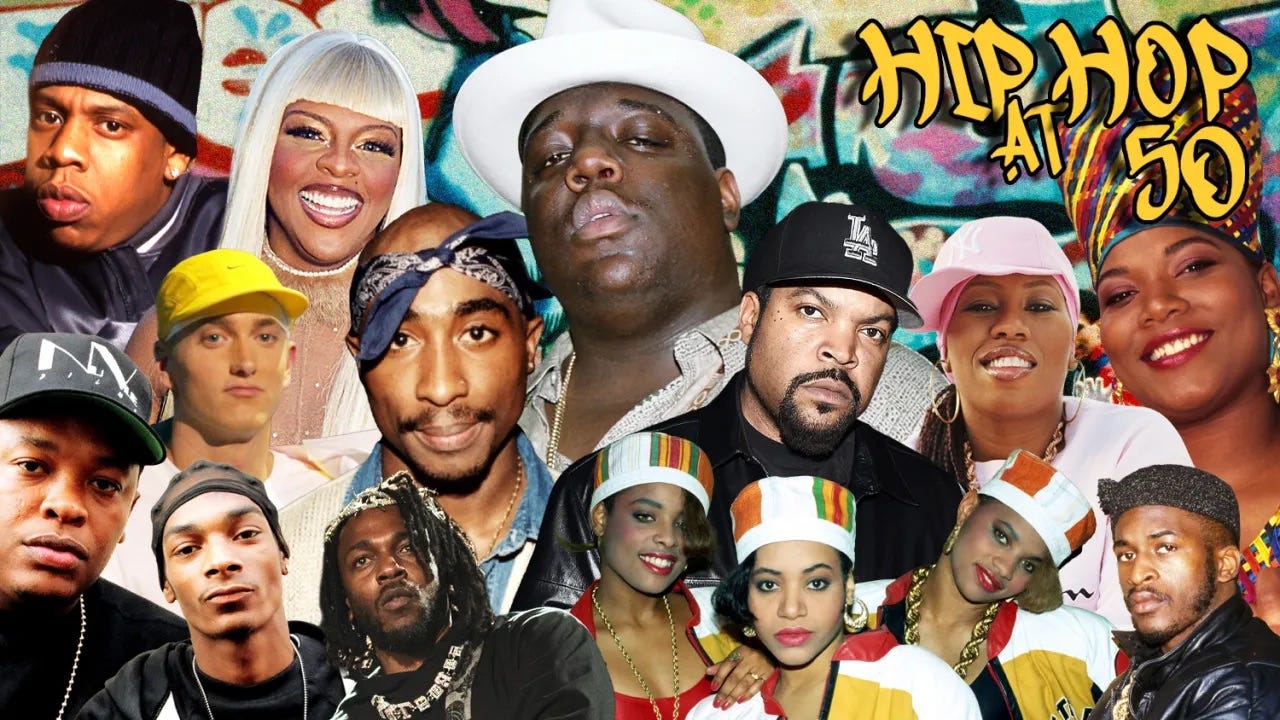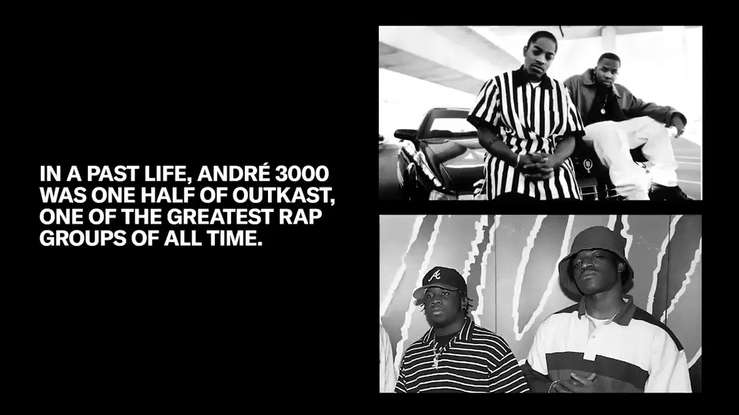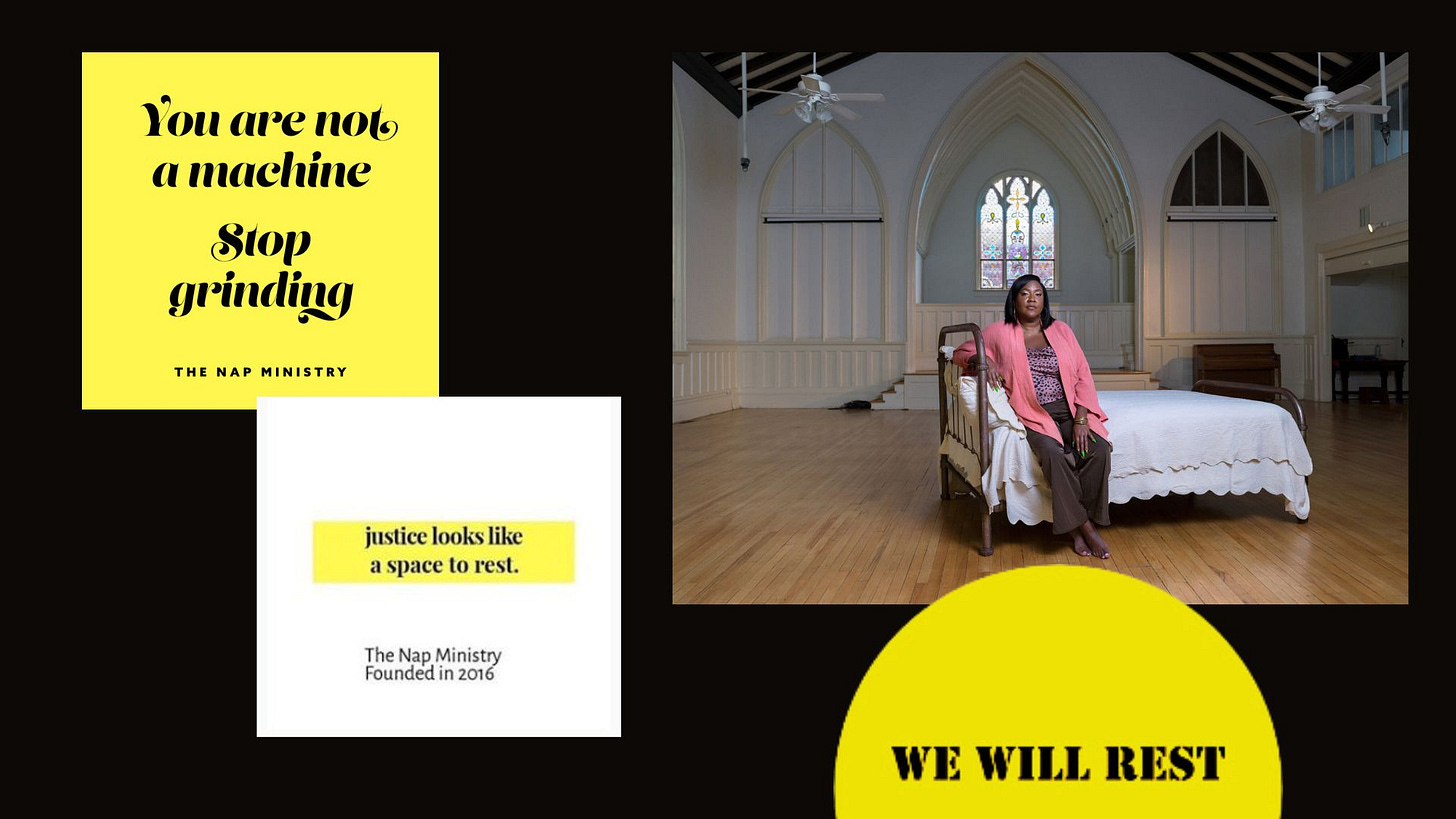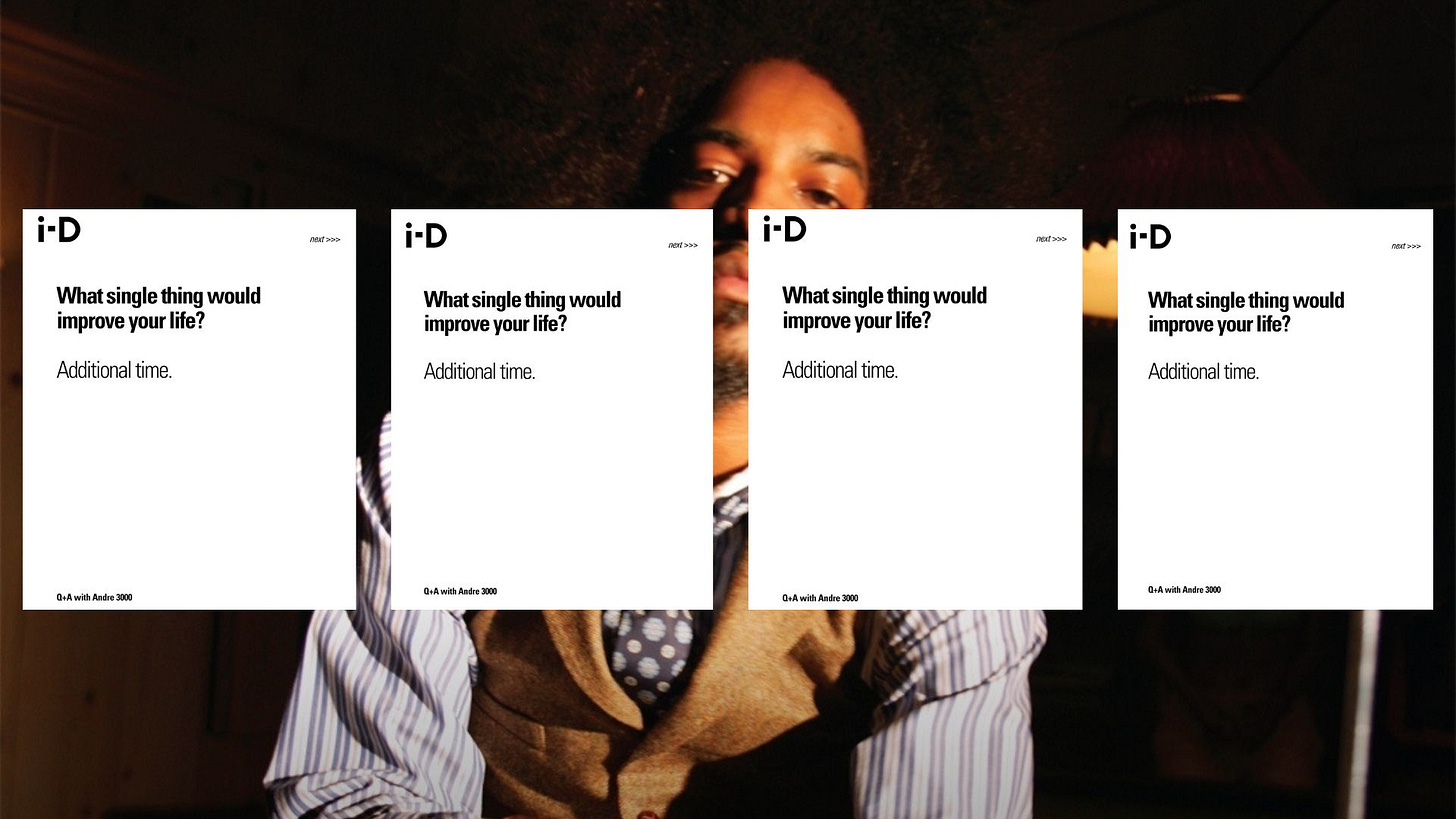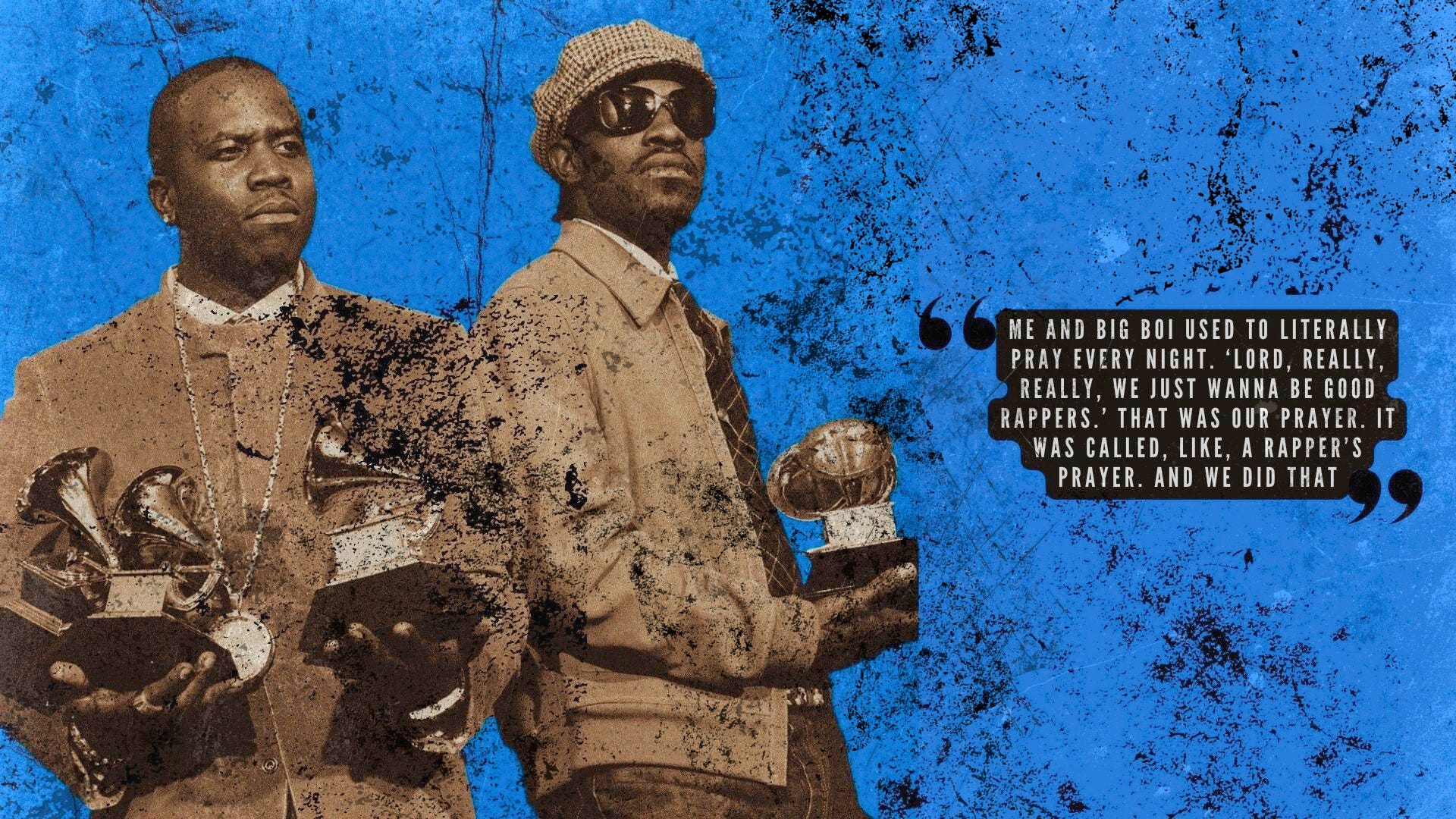This year Hip Hop celebrated its 50th anniversary. Those of us who were born into its adolescence have witnessed the maturation firsthand. We’ve grown alongside it, finding ourselves in the the lyrics of our favorite songs and learning who we wanted to become from our favorite artists turned idols. The one thing we as a collective have yet to see the genre do is learn to age gracefully. And it’s not because the culture doesn’t respect our elders. But because most artists live in fear of losing their value.
Hip Hops origins are rooted in raw, unfiltered, brutally honest depictions of life through the lens of the artists making the music. Most of the artists we fall in love with win us over with their charm, fearlessness, and bravado. Youth is an implied and inherent component of what the culture considers star quality. We may remain loyal to artists for a lifetime, but for the most part we become fans when they’re young.
At 48, Andre no longer fits the bill. In his recent GQ interview with Zach Brown, 3 Stacks is brimming with a radiant, quiet kind of wisdom. His unapologetic grey hairs, the soft age-earned creases in his skin, and paternal warmth in his smile all made one thing clear - this is not the Andre we once knew. The man in the laundromat wearing stripes and overalls is who the former rapper evolved into in solitude. Now, he’s a man who does his own laundry. A man who paints toys for his children. And (for the sake of this conversation) most notably, a man who plays the flute.
Over the course of the interview it became increasingly clear that Andre wasn’t there to talk about his past. In fact, answering those questions seemed to make him visibly uncomfortable. The way he fidgeted in his chair whenever he was addressing the subject reminded me of how I’ve felt trying to get comfortable in a really old pair of jeans. A pair I loved, and once felt comfortable in but could no longer squeeze myself into. There are some things you just grow out of. And trying no matter how much you love it putting on something that’s too small eis uncomfortable at best and suffocating otherwise.
Hearing him speak, rap sounded like Andre’s favorite pair of old jeans. No longer part of his wardrobe but still hung somewhere in his closet with fondness. A relic of his former life. A retired uniform from a chapter that helped him become the man he is today. But as he tucks his old self away, we’re forced to confront the unsettling inevitability of change.
Given the choice, I might like to live in some Twilight version of reality where I and everyone I loved could live on eternal and unchanging. But with the exception of Pharrell no one in this life is immune to the implications of time. In order for artists to be their truest selves we need to leave room for them to grow up. Even if that means letting go of the version of them we fell in love with.
Between 2010 and 2022 an entire generation of artists reached a turning point. The leaders on the (then) new school, had settled into success and were forced to face the disparities between their authentic personhood and public persona. In 2016, after an entire era of syrupy drug raps, Future admitted to hiding his sobriety from his fans. In a (later) interview with Genius he explained:
"I didn't want to tell them because I felt like then they was going to be like 'oh, his music changed because he ain't drinking lean no more.' Or, 'I can hear it when he changing.' And people be like 'Damn, why don't you even say it?' But it's hard when your fans are used to you being a certain type of way."
His honesty was reflective of movement towards transparency in the industry. Around the same time Lil Baby and a few other artists all admitted that the lifestyle they described in their music was nothing like the life they actually lived day to day. Just last year, one of the most influential artists in the last decade seeded retirement rumors. In a conversation with Billboard NBA Young Boy expressed being overcome with guilt and anxiety at the height of his career, reconciling with the repercussions of his influence on the generation watching him. He shared that growth for him wasn’t an option, it was what he needed to survive.
Despite the fact that rap artists often experience the height of their fame as young adults, they don’t get the same compassion as child actors or pop stars. We routinely witness artists publicly come of age and expect them to stay the same regardless of the toll that might take. In Hip Hop culture imitation is not an easily accepted form of art. If you’re not living your raps, your reputation comes into question. But for most artists who make it out the mud, the image that made them famous eventually becomes the thing holding them hostage.
Another hard truth is, the culture it toxically obsessed with the grind. We love a come up story. But when the artists we love reach success we’re not satisfied with letting them rest there. The music industry machine is one that often keeps us hungry for the stories of struggles that those artists are trying to escape from. Tricia Hersey of the Nap Ministry shifted culture with her assertion that rest is resistance. In a society where our value is based on how much we can produce and earn, rest is truly radical. But not all of us are seen of worthy of it.
In one of her first solo singles, JT quiets the noise about the easy-going approach she’s taken with her career since being released from prison.
Bitches always in my business, "JT, what you really do?" (What?)
I be at home playin' fetch by a swimmin' pool (bing)
{….}
Told y'all hoes I don't work jobs
I am a motherfuckin' job
Bitches always in my motherfuckin' business
Worried about what the fuck I got goin' on, ho
It's City Girl shit (ho)
Even when you think it ain't City Girl shit
I'm a City Girl, bitch
JT’s soft-girl life has been triggering to the masses, simply because we are not accustomed to seeing Black people (especially Black women) enjoy ease. For many it feels unnatural to see us embrace stillness. It seems wrong for us to reject the need to prove our worth through our ability to be excellent. But the truth is, making it to the top wouldn’t be worth it if you didn’t have the right to take a break once you got there.
For the Black artist, art goes beyond expression. It is a tool of survival. And in some cases a (maybe most) the only way out of a set of impossible circumstances. Normalcy is not just a luxury, it’s a privilege. One that those who start at the “bottom” usually go their whole lives without. And even after the come up, longevity is something many Black artists are not sure they can look forward to. In recent history the dominant narrative around rap retirement has always included the artist losing their money or their mind somewhere along the way. Rarely has an industry titan made it to their second act unscathed.
Towards the end of his interview Andre talks about making it out of the dirt (the dungeon-like basement where he produced his first album) and making it today to a place of having the time and space to tend to his garden. In a similar interview decades ago Andre told I-D Magazine that time is the one thing that would improve his life. Seeing how long awaited this sense of freedom has been only further confirms the magnitude of this moment. Him making music that soothes him rather that puts him in a place to relive his trauma is an achievement. And him reclaiming his time for himself and his loved loves ones is the ultimate sign of success.
It seems like at first glance, most of us were let down by the kind of work we received from Andre after all this time. But the thing true fans love about Andre is his innovation. I can’t help but be amazed by how even as a recluse his creative expression still seems effortlessly current. During this summer’s #brownnoise trend, the world became privy to what I consider an innate understanding within Black tradition, the healing power of sound. With this symphony of ambient sound, Andre yet again delivered in a way we didn’t even know we needed. His influence in music transcends the six studio albums he produced as part of the iconic duo he once belonged to. His legacy is as much about introducing a new way of being as it is about pioneering a new style of music. Andre’s budding career as a flute artist is much like Jordan’s second career as a baseball player. Wildly unexpected but fun to watch. According to Yachty, Andre’s new path is one that gives him hope for the future of his own career. For me New Blue Sun is an exercise in bravely embracing impermanence.
Once upon a time, success and stardom were things Andre 3000 prayed for. Present day we’ve all been lucky enough to bear witness to those prayers be answered. We’re now living in a time where the ATLiens have inhabited earth and the only thing left for their leader to conquer is the mundane. Fans of his music may always yearn for late 90s Andre to keep making the kind of music that helps us make sense of the world. But for fans of the man and not just the musician, this moment should feel like a victory. I’ve chosen to give his former rap career a NOLA-inspired second line send off. Rather than grieving the loss, I’m celebrating his music’s eternal life.
Andre starts his latest project apologizing to his fans for not being able to make a rap album. I say, maybe it’s a good thing he didn’t. Whether OG Stankonia fans choose to stream or not, Andre yet again has initiated a cultural reset. He showed us it is possible to stop choosing hardship. He reassured us there is joy to be had after you get through the grind. And for those of us still at the beginning of our journeys, he left us a new new footsteps to follow. As a culture, it’s time we let our legends live beyond the legacies they’ve created and let life take them wherever the wind blows.


